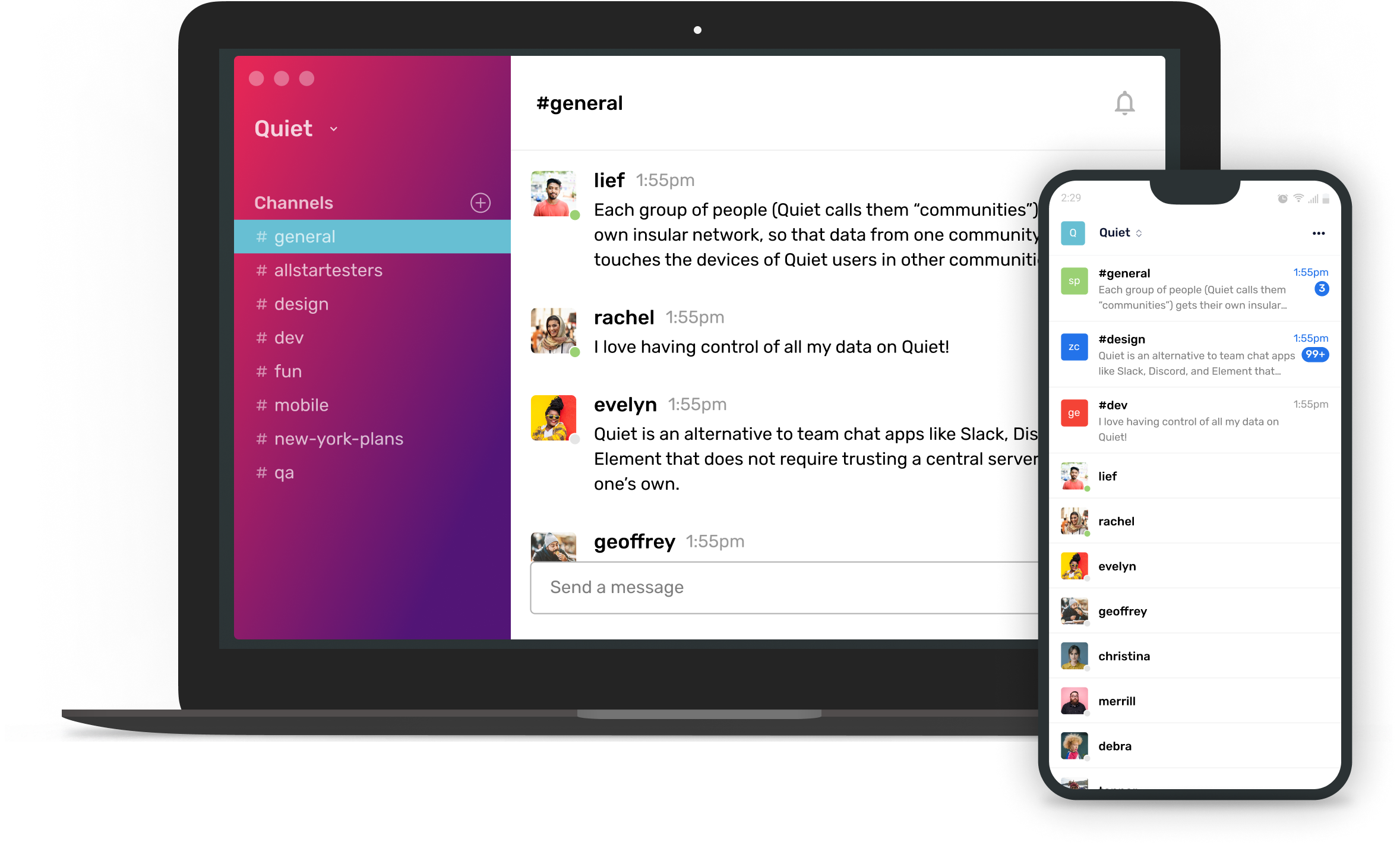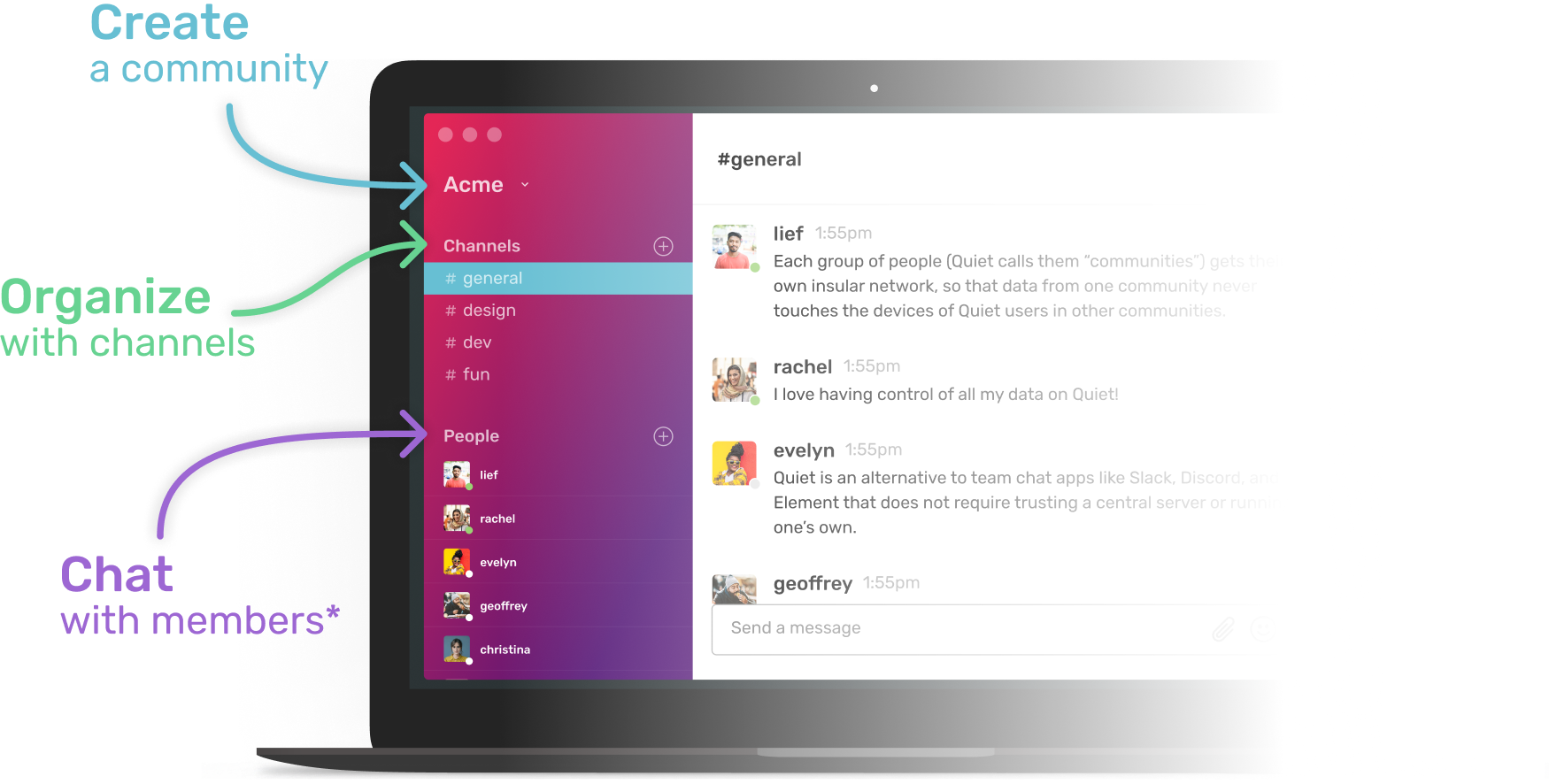Quit Big Tech. Never look back.
Whether it's for an organization, a community, or a group chat with friends, Quiet lets you control all your data without running your own servers.


While apps like Slack, Discord, and Signal use central servers, Quiet syncs messages directly between a team’s devices, over Tor, with no server required.

Quiet stores your community's data only on your community's phones and laptops, so it's always under your control.

Quiet gives you a peer-to-peer network that just works, so you can be independent and private without running your own server.
Even encrypted messaging apps like Signal can leak your phone number, who you talk to, your IP addresses, and your location. Quiet builds in the Tor privacy tool to protect that data behind a global network of volunteer relays.
Quiet is more like Slack or Discord than Signal. Create your private space and invite people to join, with channels for different kinds of conversation.

We are building Quiet to sharpen the tools open societies use to hold power accountable. The software everyone uses for work and sharing ideas has grown too dependent on company-run infrastructure, undermining free software's power to hold Big Tech accountable, distorting humanity's collective expression, and limiting bottom-up power. Our mission is to fix this, by building a Slack alternative that makes no compromises on safety or freedom.

Quiet's peer-to-peer design makes it very different from most messaging apps, but that doesn't mean it can't have all the features that make online life fun, comfortable, and productive!
Create a “community” for your team or organization and invite members.
Unlike Slack, Discord, WhatsApp, Telegram, and Signal, no email or phone number is required to create or join a community.
All data is encrypted end-to-end between member devices, using Tor.
Organize chats in Slack-like channels, so conversations don't get messy.
Send and receive images, with copy/paste, drag & drop, and image previews.
Get desktop notifications for new messages, with optional sounds.
Send and receive files of unlimited size!
Share invite links, just like in WhatsApp, Signal, or Discord.
Navigate and generally do stuff without using the mouse.
Quiet has apps for Mac, Windows, and Linux.
Quiet works on Android, and F-Droid support is on the way.
Our iPhone app is available via TestFlight.
Get notifications in our iPhone app. Apple requires some centralization for this.
Join multiple communities, like you would in Slack or Discord.
Send and receive direct messages that are encrypted to the recipient and unreadable by other community members.
Add an avatar or bio.
Send @ mentions that notify other users.
Remove users from your community.
Delete individual messages and set timed deletion rules (“disappearing messages”) for the community.
See your own connection status and the online status of other users.
Send emojis with emojicodes, and react with emojis.
Recover owner accounts from a backup phrase.
Create private channels with multiple members that are unreadable to the community at large.
Quiet gives communities more control over their software, data, and metadata than almost any privacy tool (even Signal!) while remaining easy to use.
Server breaches, where everyone's most private conversations spill out onto the public Internet forever, are a nightmare for any team. Quiet simply doesn't have servers. No servers, no breaches.
Phone numbers should be private. While Signal and WhatsApp demand a phone number and expose it to everyone you talk to and whoever might access their phone, Quiet never even asks for a phone number.
Signal and nearly every other messaging app expose your identity's IP address to a server, revealing your location. Quiet doesn't, and this matters! Location data can be used to harm you in surprising ways.
Apps like Signal & WhatsApp do encrypt messages, but they still leak metadata, such as who you talk to and when, to whoever runs the server. Quiet uses Tor to protect that too.
Unlike Slack, Discord, WhatsApp, and the rest, Quiet is completely open source. This means there is no vendor lock-in. Developers can fork Quiet and create interoperable versions.
Creating the same great group chat experience of Slack or Discord on a peer-to-peer network built on Tor is super hard. But Quiet works well, both on laptops and phones.
Quiet welcomes outside contributions! If you’d like to work on Quiet with us, see Contributing to Quiet for information on how to get started.